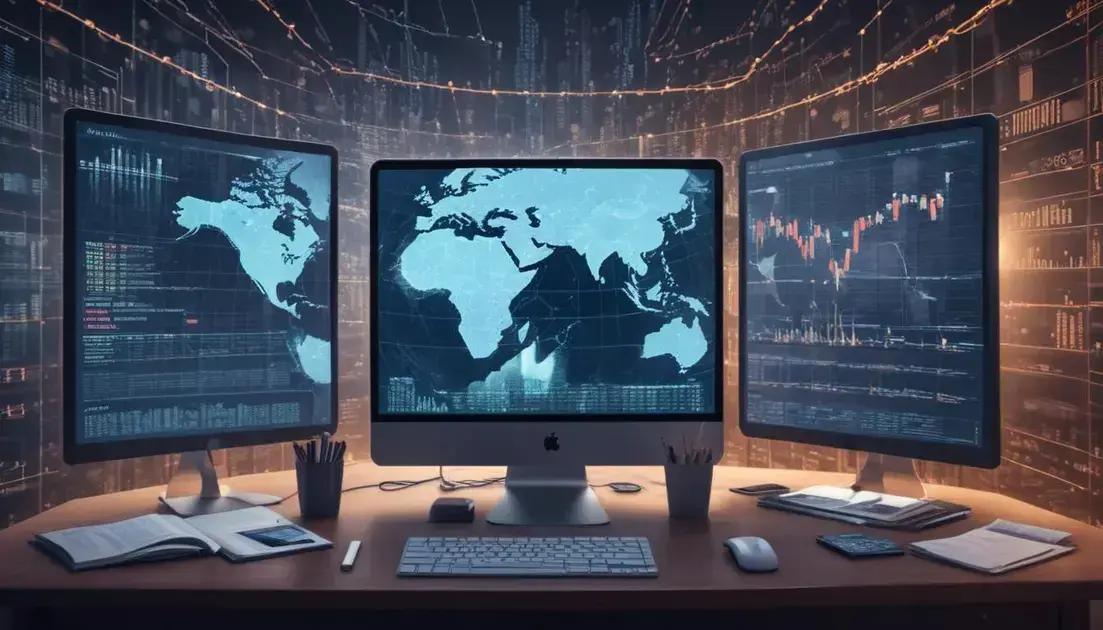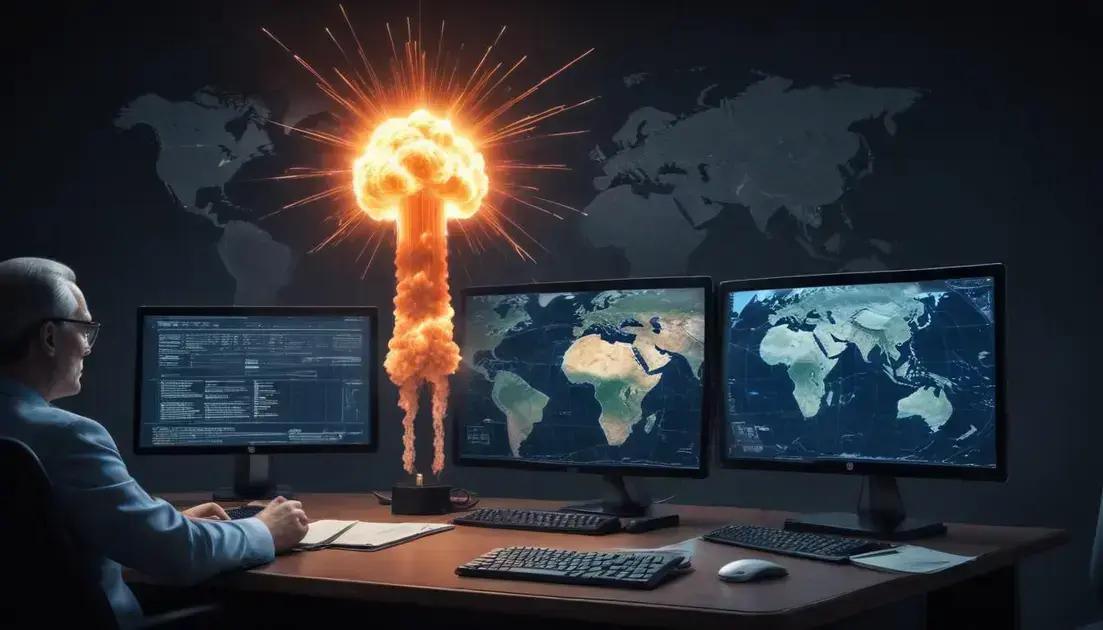
Sanctions and money: the silent war of the 21st century
Sanctions significantly affect global finance by shaping international economic relations. Recent case studies illustrate how sanctions imposed on countries like Russia and Iran have led to economic downturns and increased public discontent. As digital currencies rise, the efficacy of sanctions may wane, posing new challenges for enforcement. Future implications suggest the need for targeted policies and strengthened diplomacy as nations navigate the complexities of political and economic interdependence.
Sanctions are becoming the new frontier of warfare in the 21st century, shifting the battle from traditional battlegrounds to the world of finance. Buckle up, as we dive into this complex landscape!
The impact of sanctions on global finance
The impact of sanctions on global finance is really significant. Countries often use sanctions to influence other nations’ actions. These financial measures can disrupt trade and freeze assets.
When a government imposes sanctions, it limits the targeted country’s ability to engage in business. This can harm their economy and create challenges for people living there.
How Sanctions Affect Trade
Sanctions can reduce the flow of goods and services. For instance, companies may hesitate to trade with a sanctioned country. This hesitation can lead to shortages in essential goods.
Financial institutions also feel the pressure. Banks may refuse to process transactions involving sanctioned entities. This increases the cost of doing business, making it difficult for everyone involved.
The Ripple Effect
Sanctions can have rippling effects around the world. They can increase prices in global markets and change how countries trade.
Sometimes, neighboring nations may also face fallout due to their connection with the sanctioned country. This can lead to economic instability in unexpected places.
The Role of Digital Currencies
Digital currencies are changing the game. They offer an alternative way to conduct transactions, sometimes bypassing traditional banking methods.
This can make sanctions harder to enforce. However, it also raises concerns about fraud and security.
In conclusion, sanctions and their effects on global finance are complex. They impact many areas, from trade to economic relations. Understanding these challenges is crucial as we navigate this changing landscape.
How digital currencies are changing the game
Digital currencies are shaking up the financial world. They offer new ways to transfer money quickly and easily.
People can send money across borders without high fees. This is a big deal for many who rely on remittances.
The Rise of Cryptocurrencies
Cryptocurrencies like Bitcoin and Ethereum allow peer-to-peer transactions. This means you can trade directly with others. You don’t need banks or middlemen.
Many people see them as a better option than traditional money. They provide greater privacy and control over funds.
Challenges with Digital Currencies
However, there are challenges. Digital currencies are often seen as risky. Their values can change quickly, leading to uncertainty.
Also, many governments are still figuring out how to regulate them. This creates legal and financial gray areas for users.
Impact on Sanctions
Digital currencies also affect sanctions. They can make it harder to enforce these financial penalties. When people can use digital money, they might bypass traditional sanctions.
This adds complexity in global finance. Countries can face challenges in regulating and controlling such transactions.
Overall, digital currencies are changing how we think about money and transactions. Their rise is reshaping the connections between people and finance.
The intersection of politics and economics
The intersection of politics and economics is crucial for understanding our world. Political decisions can greatly impact economic policies.
For instance, when governments adjust taxes, it affects how businesses operate. Lower taxes often encourage growth, while higher taxes might slow it down.
The Role of Government
Governments play a key role in regulating economies. They set rules that guide how companies can operate. This includes enforcing fair trade practices and protecting consumers.
However, political motives sometimes overshadow economic needs. Politicians might prioritize short-term gain over long-term stability.
International Relations
International politics also shapes economics. Trade agreements can boost or limit economic ties between countries.
For example, countries with strong relationships can share resources and create jobs. On the other hand, political conflicts can lead to sanctions, disrupting trade.
Economic Policies and Public Sentiment
The public often responds to economic conditions. If people are unhappy with their economic situation, they may vote for change.
This can lead to shifts in political power. New leaders might propose policies aimed at improving the economy, creating a cycle of change.
Ultimately, politics and economics are deeply connected. Understanding their relationship helps make sense of many global events.
Case studies of recent sanctions
Case studies of recent sanctions show how these measures impact countries. Various nations have faced restrictions due to their actions.
One well-known example is the sanctions against Russia. These were imposed after its annexation of Crimea. The sanctions targeted key sectors like finance, energy, and military.
Effects on Russia
The sanctions led to a significant economic downturn in Russia. Many foreign companies pulled out, and investments dropped sharply. This caused higher inflation and a decrease in living standards for many people.
Another example is the sanctions on Iran. These were aimed at limiting its nuclear program. The restrictions affected oil exports and international banking.
Effects on Iran
As a result, Iran faced severe economic challenges. The government struggled to meet the needs of its citizens. Public discontent grew as essential goods became scarce.
Case studies highlight how sanctions can have far-reaching effects. They don’t just influence governments; they also impact everyday lives.
Changes in Global Relations
Countries targeted by sanctions often seek new alliances. For example, Russia has strengthened ties with China. This can shift global economic power in unexpected ways.
In summary, analyzing case studies helps us understand sanctions’ complex nature. They can create both intended and unintended consequences in the global scene.
Future implications and predictions
The future of sanctions holds many implications for global economics. As international relations change, so will the methods for enforcing sanctions.
Predicting the effectiveness of sanctions is tricky. New technologies, like digital currencies, could make them harder to enforce. Countries may find creative ways to bypass restrictions.
The Role of Digital Innovations
Digital currencies allow transactions that are less traceable. This can weaken the impact of sanctions. Governments will need to adapt to these changes and find new strategies.
Additionally, countries targeted by sanctions might strengthen alliances. They may form economic partnerships to counterbalance the effects of sanctions.
Shifts in Global Power
As some nations turn to other allies, new power dynamics will emerge. Countries like Russia and China are already exploring alternative economic systems.
This could reshape trade routes and influence on a global scale. Countries must consider these new realities when crafting foreign policies.
Potential for Evolving Policies
Policymakers may also begin to rethink traditional sanctioning strategies. They might focus on more targeted measures, hoping to reduce civilian impact.
Improved diplomacy will become essential. Building strong international coalitions can help ensure effective implementation.
In summary, future implications of sanctions suggest a constantly evolving landscape. Staying informed will be vital in understanding global economic shifts.
Conclusion
In conclusion, understanding the impact of sanctions on global finance is vital. These measures shape the way countries interact economically and politically. With the rise of digital currencies, the enforcement of sanctions is becoming more complex. Countries will need to adapt and find new strategies to deal with these changes.
Moreover, the future implications of sanctions suggest that new alliances and economic partnerships will emerge. As political landscapes shift, the need for effective diplomacy and targeted policies becomes even more important. By staying informed about these developments, we can better grasp the evolving dynamics of international relations and finance.
Overall, the connection between politics and economics continues to be crucial in shaping our world today and in the future.


